
|
September 28, 2011 - No. 3 40th Ontario General Election Did the Leaders' Debate Inform the
Electorate?
|

Meeting held at
Progress Child Care Centre in Scarborough June 12, 2011 to protest the
closing of the
centre because of underfunding. Centre was reopened after
protests by parents. |
We immigrant women and other low-income women of Toronto are among those speaking out about child care/early learning during the election. Our families are in desperate need of child care, but most of us are completely excluded from the system by high fees. With half of Toronto's children living in poor families, there are long waiting lists for low-income child care subsidies. Shamefully, Ontario funding for child care subsidies in Toronto covers only 1 in 5 eligible children.
Ontario's decision to bring in full-day kindergarten gave us some hope at first. But we have been disappointed because the government tried to do it on the cheap. There are no low-income subsidies for before and after school care. Overcrowded schools in low-income immigrant neighbourhoods are being pushed to the back of the line as FDK rolls out -- many of our schools will miss the 2014-15 final implementation target.
Lack of access to child care locks many of our families in poverty and prevents us from working our way out of poverty. Many of our women can only get minimum wage jobs. These jobs don't pay enough for us to afford even cut-rate, low quality babysitting. The Ontario Student Assistance Plan doesn't cover child care, so without subsidies women can't go back to school to qualify for better paying jobs. Underfunding of subsidies means there is no way out for us.
Successive governments in Ontario have followed the policy of underfunding child care, especially child care for low-income families. It is claimed that Ontario "can't afford" child care. Why is it then that Quebec, with an economy half the size of Ontario's, can afford a subsidized, low-cost universal child care system? Even after the cost of Ontario's full-day kindergarten kicks in, Ontario will be spending less per child on childcare/early learning than Quebec.
Quebec has found that universal child care is not only
an affordable social policy but is also good economic policy. Recent
research shows that government gets back $1.49 for every dollar
invested in child care. This pay-back comes from more women paying
income tax, reduced dependence on social assistance
and higher female labour productivity.
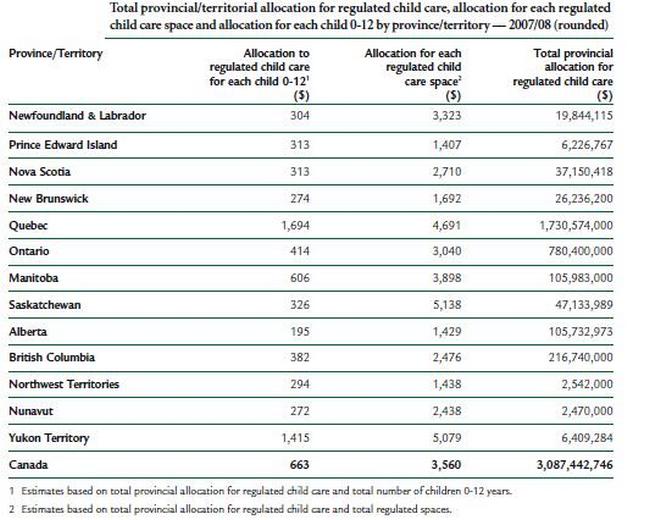
Graph shows provincial funding for child care as of 2008 by academic group CRRU which
advocates for child care/earlly learning. When $1.5 billion cost of Ontario FDK program
is added after FDK is in all schools (2014-15), Ontario will
still be spending less per child than Quebec.
Ontario's underfunding of child care just doesn't make sense, especially its gross underfunding of low-income subsidies. It is bad social policy; it is bad economic policy. Why then hasn't Ontario child care policy been brought into step with the needs of a society where most women work? It is simply a matter of political will.
When Stephen Harper's federal government totally abandoned funding for child care, his social policy minister explained this by saying that women should "stay home and take care of their own kids". It's as if women who work should be punished for having kids, punished for being women. Ontario's lack of political will to implement a sensible child care/early learning policy is a result of Ontario politicians trembling before such archaic notions about women and our role in society.
Women across Ontario are demanding the politicians show the political will to confront this kind of medieval thinking. We are demanding politicians take a stand for the fundamental right of women to fully participate in society, regardless of her status as a mother, regardless if she is rich or poor. We have a right to work so our families aren't poor. We have a right to go back to school to fulfil our aspirations. Politicians have to be held to account for practical measures for ensuring our rights. This means giving top priority to providing child care and early learning for all. This means immediate remedial action to fix this essential social service that has been allowed to lag far behind the needs of women and children in a modern society.
Full Funding of
Low-Income Child Care Subsidies Now!
Accessible, Affordable, Qualtiy Child Care and Early Learning for All!
* Pritilata Waddedar is a community organizer among Toronto's immigrant women.
In Defence of Public Services
Mass Rally at Toronto City Hall
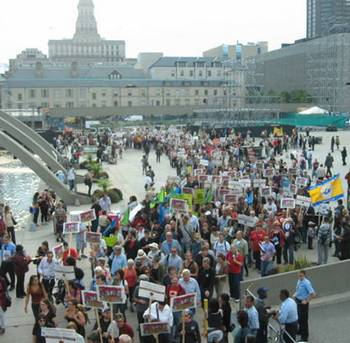
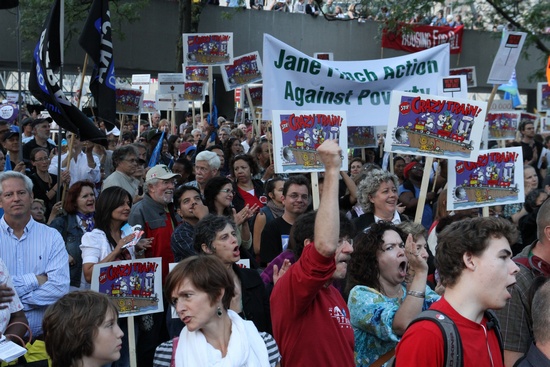
Close to 7,000 people rallied at Toronto City Hall on Monday, September 26, to defend public services and the workers who provide them. City workers and other public sector workers were there en masse, joined by workers from all other major sectors of the economy, including steel and auto, and a large number of representatives from community organizations fighting for social housing and services such as child care, care for the poor and the disabled, immigrant services and respect for injured workers. The presence of hundreds of youth was particularly noteworthy.
The rally, held as Toronto City Council was to vote on the Core Service Review ordered by the Ford administration, firmly opposed the wrecking of the city for private monopoly interests. The program of the Toronto Mayor endorses massive cutbacks and privatization combined with a new wave of user fees, across the board cutbacks in city departments under the hoax of efficiency, the elimination of thousands of unionized jobs and an expected increase of property taxes. In his speech to City Council, Mayor Ford said that there are 7,000 too many city workers in Toronto . He said that 90 per cent of "ordinary Torontonians" support his agenda and have given him the mandate to get rid of the "gravy." His administration is staying the course whatever happens, he said.
The mass rally put the lie to this claim. While the Ford
administration is proceeding to further sell off Toronto to private
global monopolies under the hoax of defending "ordinary Torontonians,"
these Torontonians firmly defended the public sector workers, opposed
this arrogant dictate and opposed their political
marginalization. "We Are Not for Sale" they shouted loudly as they
called on city councillors to take a stand against what the Ford
brothers are up to.
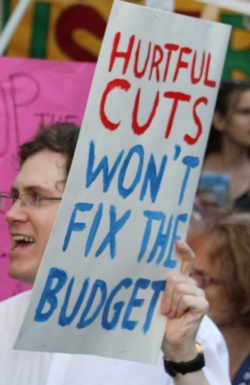
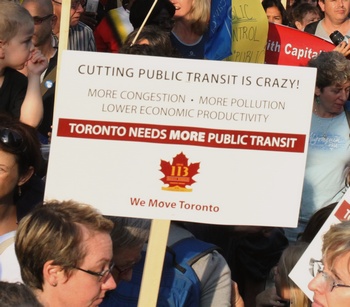

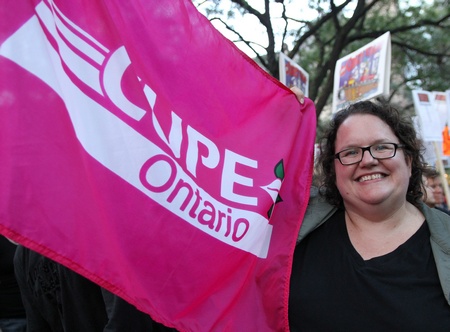
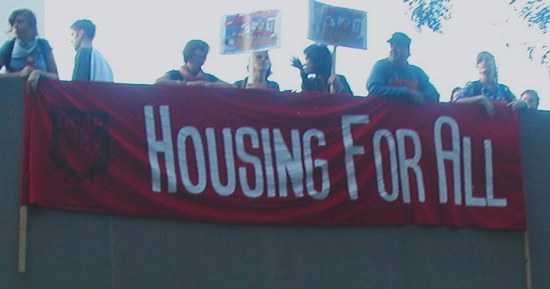
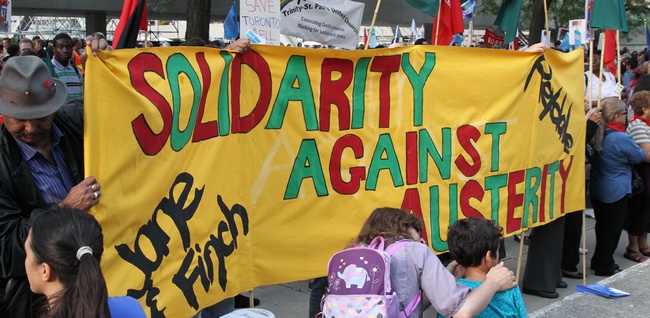
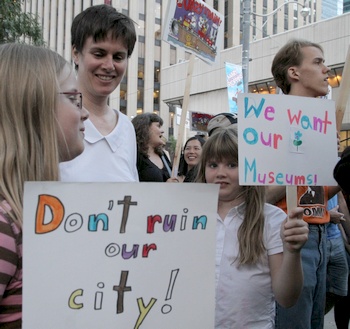
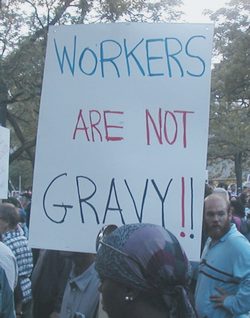
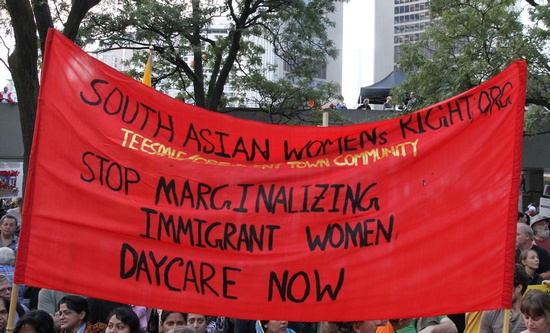
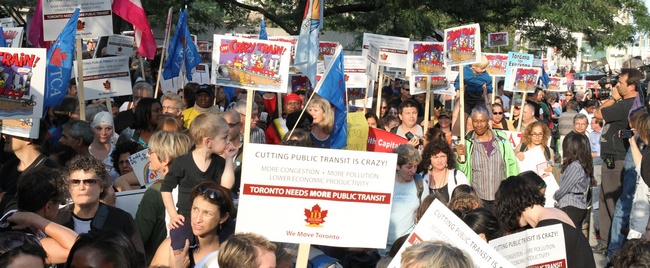
(Photos: TML, OFL)
Toronto
Resistance to the City-Wreckers Grows
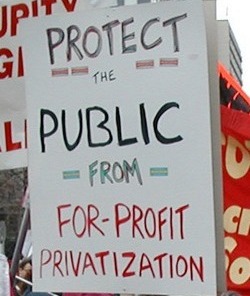 In growing numbers the
people of Toronto are taking a stand against the anti-social agenda of
the city government. From participating in institutional venues, like
deputations to municipal committees, to mass protests and beyond, the
popular repudiation of the mayor's city-wrecking schemes has become
louder
and louder as the reality behind the talk of "respect for taxpayers,"
"gravy" and "budget shortfall" is revealed in all its ugliness.
In growing numbers the
people of Toronto are taking a stand against the anti-social agenda of
the city government. From participating in institutional venues, like
deputations to municipal committees, to mass protests and beyond, the
popular repudiation of the mayor's city-wrecking schemes has become
louder
and louder as the reality behind the talk of "respect for taxpayers,"
"gravy" and "budget shortfall" is revealed in all its ugliness.
On July 28 and through the night and early morning hours of July 29, for 22 hours resident after resident denounced proposals for cuts to public social programs and services and the attack on the workers who provide the services. A further storm of outrage burst open on the city regime as the public library system came under specific threat and those dictating the wrecking agenda shamelessly expressed their disdain for culture. As the various council committees met in mid-September, hundreds of residents again came forward in deputations to resist the retrograde drive of those in power. This culminated in the September 19 Executive Committee meeting where for 20 hours people addressed the Mayor's handpicked members, demanding their course be reversed.
One feature of these events has been the near unanimous opposition residents have mounted. Regime spokespersons have been reduced to muttering about an (absent) Nixonian silent majority and disparaging the participants as somehow illegitimate, unrepresentative and unworthy of consideration.
Another feature of the whole process has been the regime's attempts to manipulate the people of Toronto into a debate that accepts its basic premise of the need for cuts, privatization and an offensive against the city workers, while merely picking and choosing what should be saved or wrecked. The residents of Toronto have said no to that diversion and rejected the regime's agenda, premise and all.
In addition to trying to discredit the participants in the deputation forums, which have long been a part of the official municipal political process, the regime manipulates the procedures so as to block the expression of the people's demands. Since the committees have chosen to sit continuously, it forces residents to be present late into the night and early morning, excluding many and causing hardship for others. Likewise, the time allotted to speakers has often been reduced from the usual 5 minutes to 3 minutes and, on September 19, to 2 minutes. The Mayor's main contribution as chair of that event was to interrupt one speaker after another in mid-sentence.
Throughout the process, the regime has blatantly ignored the demands of the people of Toronto even when they are so clearly expressed in forums whose stated purpose is to provide "public input." Aside from manifesting wilful deafness, regime personalities assert the supposed budget crisis as a fait accompli which deputants must accept or be dismissed. And they increasingly fall back to the position that, having managed to win the past election (with disinformation, manipulation and 24 per cent of voters), they shall rule, implicitly, no matter what the people think.
Far from being a fait accompli, the oft cited budget shortfall is the pretext for the wrecking agenda, for handing over to private monopoly business interests what has remained public after years of an anti-social offensive at all levels of government. Decisions taken early in the Ford regime directly created much of the deficit in question. Subsequently, the regime has exaggerated its size for the desired effect. If one did not know better, listening to their arguments one would think Toronto (and Canada) is a society so unproductive, so bereft of wealth, it simply cannot provide a decent, secure life to a great many of its people. Ruled out is any consideration of why the very rich and their monopolies have become so wealthy, of how the neo-liberal governments in their service have paid the rich at the expense of the society, especially the workers who produce this wealth, and the poor and vulnerable. But if the society, in this case the city, confronts the unfulfilled needs of its people, should it not appropriate its socially produced wealth to meet those needs?
Those in power here municipally would conveniently say the rules set by other levels of government limit sources of revenue mainly to property tax and (increasingly) user fees, among a few others. But these same individuals are the closest associates of those in power at other levels, as well as being closely attuned to the interests of the very rich and as such dedicated to maintaining their privilege. It is not they who would lead the people to demand changes from the province and Ottawa so the social wealth created in Toronto and Canada can be dedicated to the well-being of the people.
Mayor Ford and his councillor brother, themselves quite wealthy, are closely attached to the word "gravy" which they use as a synonym for waste and corruption, and of which they claim to know a great deal. But his "gravy" has turned out to be the public social programs and services needed by the people of Toronto and the jobs and modest remuneration of the municipal workers who provide them. For the people of Toronto, the waste lies elsewhere in the social wealth produced by the society but put out of reach and in the hands of the monopolies and very rich. A part of this involves the relations between the city government and private business which are longstanding and have been growing since long before the Ford regime took power. Some witnesses to that phenomenon would describe these relations as a gold mine for private engineering firms, construction companies, suppliers of goods and equipment and services and of course financiers. These relations by which the city joins other levels of government in paying the rich, are precisely ones the Ford regime is expanding by plans for more privatization, partnerships with business, contracts, selling of assets, development extravaganzas etc.
Government at all levels bears responsibility for the well-being of society and the people. It is a travesty for this regime to propose devastating the already difficult lives of the poor and vulnerable, depriving the workers who provide the social programs and services of their livelihoods, degrading or eliminating public services required by a modern city instead of finding solutions that allow society to use the wealth it produces to provide for its needs. The people of Toronto in action have managed to take some of the steam out of the Ford regime's anti-social drive. Those in power now talk of compromise, deferral of decisions and even promises not to cut this or that. This is because of the people's resistance, but no one should doubt the intentions of these retrograde forces remain unchanged. Toronto's city government is in the hands of a band of anti-social rogues and wreckers. If one tactic fails them, another will be tried. We need to pursue this struggle, utterly stop and reverse this regime's offensive, drive these rogues from power and establish ourselves as the decision-makers.
Read Ontario Political Forum
Website: www.cpcml.ca
Email: ontario@cpcml.ca
